Paris attacks: Weapons found in 'getaway car'
- Published
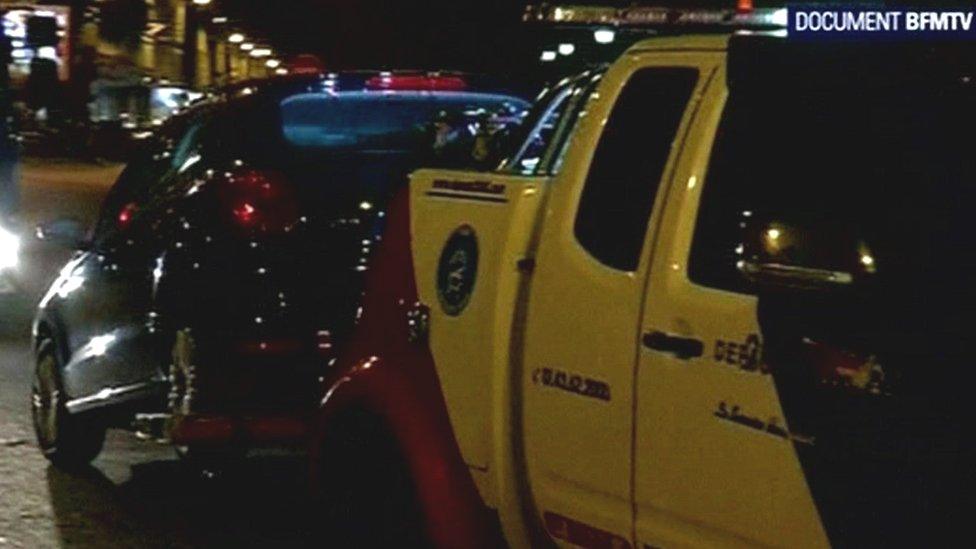
The suspected getaway car was towed away by investigators
Several Kalashnikovs have been found in an abandoned car believed to have been used by some of the Paris attackers, French judicial sources say.
The black Seat car was found in the eastern Paris suburb of Montreuil on Sunday, suggesting some of the attackers got away.
Earlier, the first of the seven dead attackers was named as Ismail Mostefai. Six people close to him are in custody.
Two attackers were French nationals living in Belgium, prosecutors said.
France is marking three days of mourning for the 129 people killed in the attacks.
Prime Minister Manuel Valls said most of the bodies had been identified and that the process should be completed in the coming hours.
A special service for the victims, including 350 people wounded and other survivors, is being held at Paris's Notre Dame Cathedral later on Sunday.
Friday's attacks, claimed by Islamic State (IS) militants, hit a concert hall, a major sports stadium, restaurants and bars in the French capital.
In political developments:
Mr Valls says France will continue with air strikes against IS in Syria, and described the group as a very well-organised enemy
EU justice and interior ministers will hold an emergency meeting on Friday to discuss security measures
President Francois Hollande cancelled plans to attend a G20 meeting in Turkey on Sunday and has held meetings with political leaders
Belgian link?
The Seat car found in Montreuil is believed to have been used by gunmen who opened fire on people in restaurants on Friday, police say.
Several AK47 rifles were found in the car, French media quote judicial sources as saying.
The Seat and another car used in the attacks - a Volkswagen Polo - were rented in Belgium.
The black VW was found near the Bataclan concert venue, where nearly 90 people were killed.
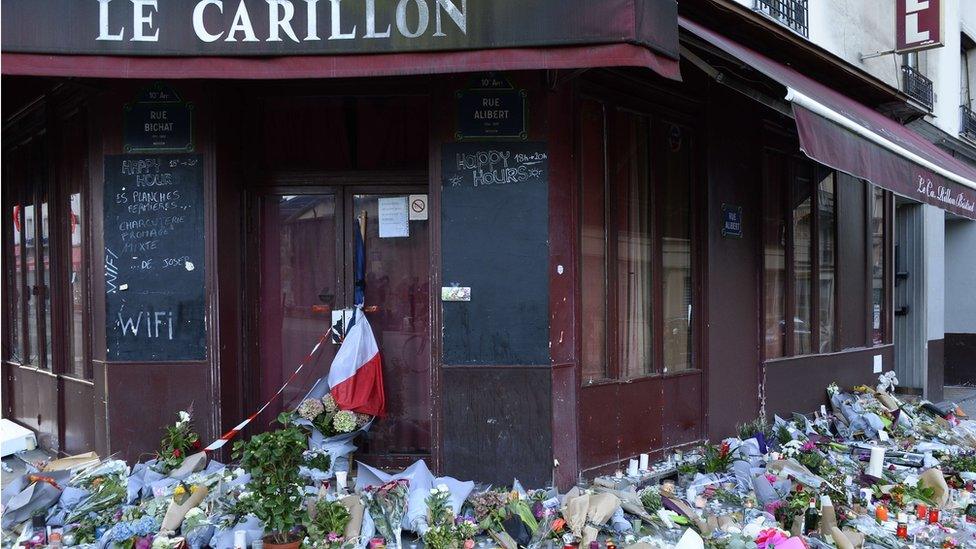
Tributes are placed at Le Carillon bar in rue Alibert...
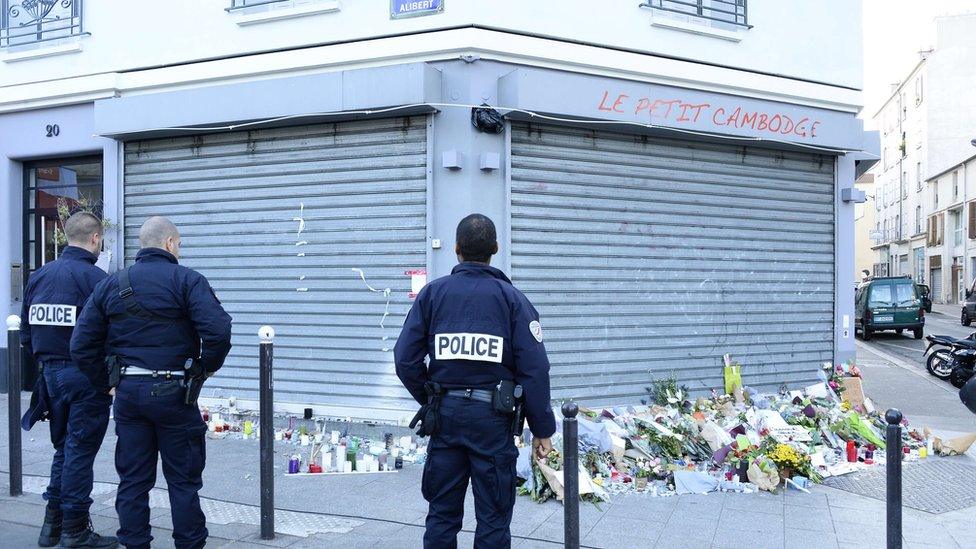
...and Le Petit Cambodge (Little Cambodia) also in rue Alibert, where 15 people died
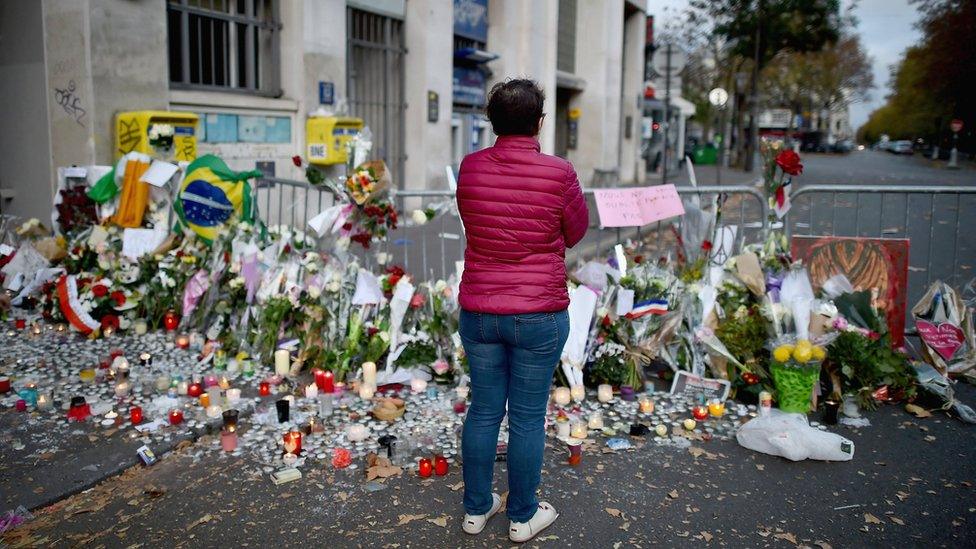
Also near the Bataclan concert hall, where nearly 90 people died
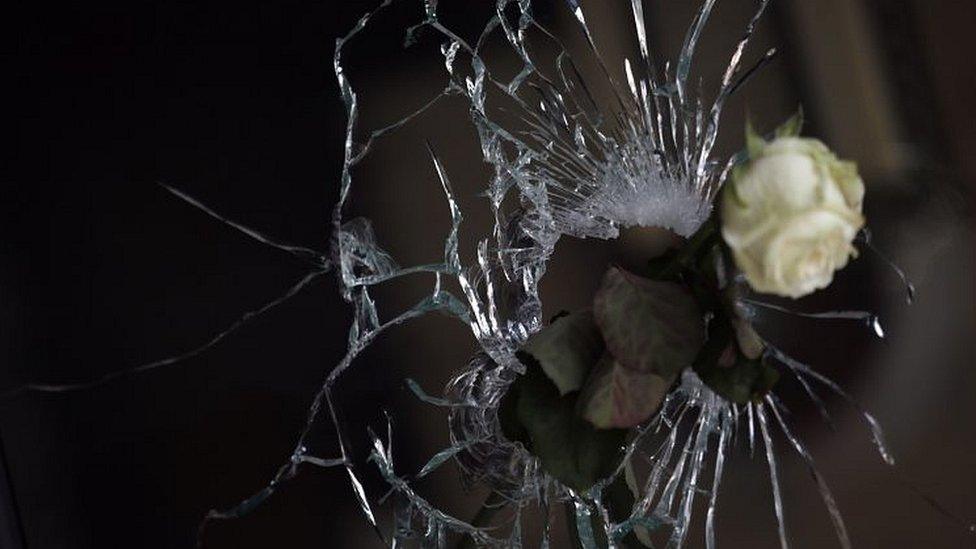
A rose is left in a bullet hole near La Belle Equipe, where 19 people died
One of the Paris attackers lived in Brussels and another in the nearby town of Molenbeek, Belgian prosecutors said on Sunday, without naming either.
A total of seven men have been arrested in Molenbeek, they added.
It is widely believed now that at least one of the attackers managed to get away from the scene - possibly the person who rented a car - and he is now the focus of an intensive manhunt, the BBC's Hugh Schofield reports from Paris.
Paris chief prosecutor Francois Molins said on Saturday: "We can say at this stage of the investigation there were probably three co-ordinated teams of terrorists behind this barbaric act,"
"We have to find out where they came from... and how they were financed."
Footage from Seb Snow shows Eagles of Death Metal on stage before a hail of gunfire
A Syrian passport, found near the body of one of the attackers at the Stade de France, had been used to travel through the Greek island of Leros last month, Greek officials have confirmed.
Serbia says the holder of that passport had also crossed its border from Macedonia and sought asylum at one of its registration centres.
No direct link has yet been made with the holder of the passport and the attackers.
History of petty crime
Mostefai was reportedly identified after investigators found a severed finger at the scene of the worst atrocity, the Bataclan concert hall.
He came from the town of Courcouronnes, south of Paris, and had lived in the city of Chartres 100km (60 miles) south-west of Paris until 2012 and had regularly attended a mosque there.

Attack sites:
La Belle Equipe, external, 92 rue de Charonne, 11th district - 19 dead in gun attacks
Le Carillon bar, external and Le Petit Cambodge restaurant, external at rue Alibert, 10th district - 15 dead in gun attacks
La Casa Nostra restaurant, external, 92 rue de la Fontaine au Roi, 11th district - five dead in gun attacks
Stade de France, external, St Denis, just north of Paris - explosions heard outside venue, three attackers and bystander dead
Bataclan concert venue, 50 Boulevard Voltaire, 11th district - 89 dead when stormed by gunmen


Mostefai, 29, had a history of petty crime but was never jailed. The security services deemed him to have been radicalised in 2010 but he was never implicated in a counter-terrorism investigation.
Police are said to be trying to find out whether he travelled to Syria in 2014.
His father, brother and sister-in-law are among six people close to Mostefai who have reportedly been taken into police custody.
His brother said he had not had contact with him for several years following family disputes, but said he was surprised to hear he had been radicalised.
He was one of six children in the family and had travelled to Algeria with his family and young daughter, the brother said.
How the attacks in Paris unfolded on 13 November 2015
Vigils were held across the world on Saturday to show solidarity with Paris
The attacks have sparked intense debate on France's ethnic and cultural values
Friday night's attacks are the worst France has experienced in peacetime since World War Two. They are also the deadliest in Europe since the 2004 Madrid bombings.
Islamic State said it carried out the attacks on "carefully chosen targets" and that they were a response to France's involvement in the air strikes on IS militants in Syria and Iraq.
President Hollande said France had been "attacked in a cowardly shameful and violent way" and vowed to be "merciless" in its response to IS militants.

Are you in the area? Have you been affected by what has been happening? Do you have any information you can share? If it is safe to do so, you can get in touch by emailing haveyoursay@bbc.co.uk, external.
Please include a contact number if you are willing to speak to a BBC journalist. You can also contact us in the following ways:
WhatsApp: +44 7525 900971
Send pictures/video to yourpics@bbc.co.uk, external
Tweet: @BBC_HaveYourSay, external
Send an SMS or MMS to +44 7624 800 100